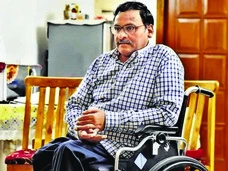By Sanjay Raman Sinha
The tragic demise of GN Saibaba, a former Delhi University professor, is yet another painful reminder of the ordeal faced by those charged under the Unlawful Activities (Prevention) Act (UAPA) and similar draconian laws.
Arrested in 2014 for alleged Maoist links, Saibaba, a 90% disabled and wheelchair-bound academic, languished behind bars for nearly a decade. His death, after complications from gall bladder surgery, underscores the appalling reality that the UAPA often results in long-term incarceration without a fair or timely resolution, depriving individuals of justice through delay. Saibaba’s life was emblematic of the oppressive nature of the UAPA, a law intended to curb terrorism, but often misused to curtail individual freedoms.
Despite his severe disabilities, Saibaba was denied bail repeatedly, forcing him to fight a protracted legal battle from prison. His health deteriorated significantly during his incarceration and his pleas for medical bail were systematically rejected. It was only in 2023 that the Bombay High Court acquitted him, citing procedural lapses. But by then, the damage had been done—Saibaba’s health was beyond repair and the belated acquittal came far too late to save him.
His story is not an isolated one. Many UAPA detainees endure similarly harsh treatment. The UAPA, notorious for its stringent provisions, permits extended custodial remand and grants the State considerable leeway in holding individuals for prolonged periods without formal charges. Under the UAPA, police custody can extend up to 180 days, far exceeding the 60-90 day limit under the more recently renamed Criminal Procedure Code, now known as the Nagarik Suraksha Sanhita.
Worse still, the UAPA provides almost no provision for anticipatory bail, with bail routinely denied if the court is satisfied that the allegations seem prima facie true—effectively conducting a mini-trial at the bail stage. This excessive legal framework strips the accused of basic rights, turning the very idea of justice on its head. The case of Saibaba illustrates the punitive use of legal technicalities to incarcerate individuals indefinitely, often on tenuous evidence. His long ordeal shines a harsh light on the shortcomings of a system that prioritizes national security over civil liberties, sometimes to devastating effect.
Despite such tragedies, there have been recent developments suggesting that a shift in bail jurisprudence might be possible. In October 2024, the Supreme Court granted interim bail to a defendant under the Prevention of Money Laundering Act (PMLA), a law with bail provisions as stringent as those in the UAPA. In granting this bail, the bench led by Chief Justice of India DY Chandrachud emphasized that sick or infirm individuals deserve to be treated with compassion.
This ruling offers a glimmer of hope for those wrongfully detained under similar conditions, such as UAPA detainees, who may yet see relief under a reformed judicial approach. In other cases, such as Union of India vs KA Najeeb (2021), the Supreme Court urged vigilance in ensuring that civil liberties are not undermined by the overreach of security laws.
These decisions may pave the way for rethinking how UAPA cases are handled, where the emphasis could shift from the automatic denial of bail to a more balanced consideration of individual rights and the presumption of innocence. Yet, even these precedents have come too late for Saibaba and others like him.
Sudha Bharadwaj, an activist, and lawyer, spent three years in jail before being granted bail in 2021. Poet Varavara Rao, aged 82, suffered prolonged detention despite his frail health, while Father Stan Swamy, an 84-year-old Jesuit priest suffering from Parkinson’s disease, died awaiting trial under the UAPA in 2021.
These stories reflect a broader systemic issue. The UAPA continues to be wielded as a blunt instrument, eroding the constitutional guarantees of life and liberty. In the aftermath of Saibaba’s death, the judiciary and government must seriously consider a compassionate overhaul of this law. The recent reform of bail provisions under the PMLA is an encouraging step, but much more needs to be done to ensure that UAPA detainees are not deprived of their fundamental rights.
There is a pressing need to reconcile national security with human rights, especially in cases where the accused face lengthy detentions without trial. The judiciary, entrusted by the Constitution to safeguard citizens from executive overreach, must rise to the occasion and create a more humane bail jurisprudence for UAPA detainees. Only then can we ensure that the tragic tales of Saibaba, Stan Swamy, and countless others are not repeated.
The Saibaba Saga
- April 2016: The Supreme Court grants GN Saibaba bail and criticizes the Maharashtra government for his prolonged detention.
- March 2017: Saibaba, along with Hem Mishra, Prashant Rahi, Mahesh Tirki and Pandu Narote, is convicted under UAPA and sentenced to life imprisonment.
- October 14, 2022: The Nagpur bench of the Bombay High Court acquits Saibaba and the other accused.
- October 15, 2022: The Supreme Court suspends the acquittal, citing procedural gaps in the High Court ruling.
- April 19, 2023: The Supreme Court annuls the High Court order and refers the case back to a different bench.
- March 5, 2024: The Nagpur bench acquits Saibaba again.
- March 7, 2024: Saibaba is finally released from prison.


